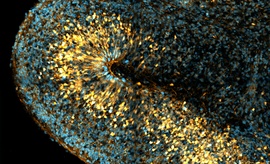Endosomal trafficking defects alter neural progenitor proliferation and cause microcephaly
AbstractPrimary microcephaly and megalencephaly are severe brain malformations defined by reduced and increased brain size, respectively. Whether these two pathologies arise from related alterations at the molecular level is unclear. Microcephaly has been largely associated with centrosomal defects, leading to cell death. Here, we investigated the consequences of WDR81 loss of function, which cause severe microcephaly in patients. We show that WDR81 regulates endosomal trafficking of EGFR, and that loss of function leads to reduced MAP kinase pathway activation. Mouse radial glial progenitor cells knocked-out for WDR81 display reduced proliferation rates, leading to reduced brain size. These proliferation defects are rescued in vivo by the expression of megalencephaly-causing mutated Cyclin D2. Our results identify the endosomal machinery as an important regulator of RG cell proliferation rates and brain growth. They demonstrate that microcephaly and megalencephaly can be due to opposite effects on the proliferation rate of radial glial progenitors.


